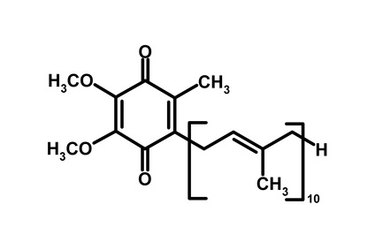
Dietary aids can cause side effects, but they also offer you health benefits. Coenzyme Q10 has become the third most popular supplement, according to a 2008 report from the Natural and Nutritional Products Industry Center published on NewHope360.com. Your body naturally makes this substance, but disease and aging can reduce its production. Manufacturers selling CoQ10 often make wild claims about their product. Scientists have yet to document many of these claims, but CoQ10 does have known effects. Speak with your doctor before taking this or any other nutraceutical.
Treats Experimental Cancer
Video of the Day
The incidence of cancer continues to increase in some populations, according to a 2011 report by the National Cancer Institute. Improvements in health care, exercise and diet have reduced the number of cancer deaths, but much work remains. Dietary supplements might play a positive role towards eliminating cancer. A Korean study published in 2010 in the "Journal of Nutritional Science and Vitaminology" looked at CoQ10's impact on an animal model of colon cancer. Control rats received 1,2-dimethylhydrazine -- a substance known to cause cancer -- for six weeks. Treated rats also received supplementation during this time. The CoQ10 supplementation reduced tumor growth 80 percent relative to no treatment.
Video of the Day
Enhances Athletic Performance
Athletes continue taking performance-enhancing drugs despite the well-known risks. According to a 2011 review by Australian researchers in the "Journal of Science and Medicine in Sport," athletes enjoy the rewards of enhancement but fear being labeled as a cheater. Legal nutraceuticals might help them resolve this ethical dilemma. A randomized, double-blind, crossover study by Turkish researchers, published in the January 2010 issue of the "Journal of Strength and Conditioning Research," evaluated coenzyme Q10 as an ergogenic aid. Healthy men received either the supplement or a placebo during a single testing session. They returned to the laboratory on a later date to receive the other condition. Relative to placebo, the subjects demonstrated more strength and less fatigue while taking CoQ10.
Improves Sexual Functioning
Erectile dysfunction, ED, affects men of all ages. Different physical and mental causes underlie this disorder. Many men with Peyronie's disease -- penile scarring and curvature -- experience ED, according to a 2011 paper in the "Journal of Andrology." Surgery remains the primary treatment for progressive Peyronie's disease. An Iranian study published in the "International Journal of Impotence Research" in 2010 assessed CoQ10's effect on Peyronie's. In a clinical trial, male patients received the coenzyme or a placebo for six months. CoQ10 improved penile function relative to placebo. It also reduced scarring and curvature. Peyronie's progressed in 56 percent of the patients given placebo, but in only 13 percent of the men given CoQ10.
Reduces Headache Severity
Migraine headaches remain a pervasive problem in society. According to a 2007 survey in "Neurology," about 12 percent of the population experiences at least one migraine each year. These attacks affect all age groups, including children. Kids must be particularly careful about receiving treatment, as many drugs have adverse effects on development. A clinical trial published in the January 2007 issue of "Headache" tested CoQ10's ability to relieve headaches in minors. The authors first measured circulating levels of CoQ10 in a pediatric and adolescent population at Cincinnati Children's Hospital Medical Center. Many of the children had a deficiency and began supplementation. The latter treatment reduced headache frequency and enhanced daily functioning. Ingesting CoQ10 appeared safe.
- NewHope360.com: Coenzyme Q10 Continues To Gain in Popularity; NPI Center; Jan. 22, 2008
- "Journal of the National Cancer Institute"; Annual Report to the Nation on the Status of Cancer, 1975-2007, Featuring Tumors of the Brain and Other Nervous System; Betsy A. Kohler, et al.; March 31, 2011
- "Journal of Nutritional Science and Vitaminology"; Coenzyme Q10 Attenuated DMH-Induced Precancerous Lesions in SD Rats; Jung-Mi Kim and Eunju Park; 2010
- "Journal of Science and Medicine in Sport"; Examination of the Sport Drug Control Model with Elite Australian Athletes; Daniel F. Gucciardi, et al.; April 22, 2011
- "Journal of Strength and Conditioning Research"; Effects of Coenzyme Q10 Supplementation on Performance During Repeated Bouts of Supramaximal Exercise in Sedentary Men; Hakk Gokbel, et al.; January 2010
- "Journal of Andrology"; Factors Affecting the Degree of Penile Deformity in Peyronie's Disease: An Analysis of 1001 Patients; Ates Kadioglu, et al.; Jan. 13, 2011
- "International Journal of Impotence Research"; Safety ...; Mohammad Reza Safarinejad, et al.; 2010
- "Neurology"; Migraine Prevalence, Disease Burden, and ...; Richard B. Lipton, et al.; Jan. 30, 2007
- "Headache"; Coenzyme Q10 Deficiency and Response to ...; Andrew D. Hershey, et al.; January 2007